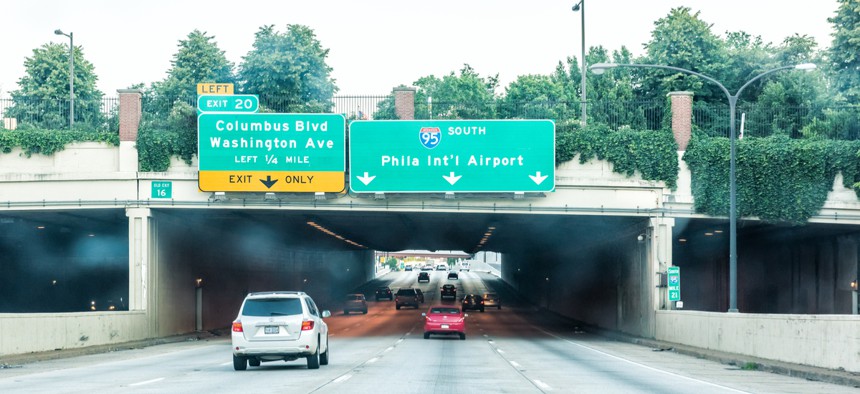Connecting state and local government leaders
COMMENTARY | Manhattan Institute’s Michael Hendrix hopes we’ll not only look to the new, but consider taking down the old to “reknit” our urban fabric.
NEW YORK — President’s Trump’s 2018 State of the Union address promised to “build gleaming new roads, bridges, highways, railways, and waterways across our land,” but state and local governments who will need to be partners in his $1.5 trillion infrastructure plan, should also consider what infrastructure may no longer fit our cities.
Making America’s infrastructure great again must mean doing more with less. And that may mean fewer highways. Transforming urban freeways that are reaching the end of their lifespan may be cheaper—and better for everyday people—than repairing or building them anew. That means right-sizing, relocating, or simply removing costly highways in the heart of cities.
The Innerbelt in Akron, Ohio is typical of our overbuilt highway system. Cones wave off traffic from an empty stretch of six-lane freeway running through the middle of the city’s downtown. Half-built in the 1970s, this “road to nowhere” became a concrete drain on Akron’s talent poured straight over a historically black community.
There are 160,000 miles of state-owned urban highway. Most of these highways were built nearly for free, as far as states and cities were concerned. Today, they’re proving to be anything but. Urban freeways left a costly legacy of blight, crime, and racial segregation. And today their upkeep bill runs into the hundreds of billions of dollars.
For the past decade, the Congress for the New Urbanism has kept a running top 10 list of “freeways without futures.” The Scajaquada Expressway in Buffalo, for instance, bisects the city like a Berlin Wall. This 3.2-mile “tear in the urban fabric,” as The New York Times put it, is falling apart. Converting the expressway into a lower-speed, park-like urban boulevard would inexpensively and safely restore Buffalo’s urban landscape with minimal impact on traffic.
Buffalo is far from alone. Dallas’ aging Interstate 345 cuts off downtown from its hip Deep Ellum neighborhood. Rochester, New York’s Inner Loop has been called a “noose around the city” and a “moat” for downtown. The riverfronts of St. Louis and Philadelphia sit on the other side of concrete chasms from adjacent neighborhoods.
Syracuse, Trenton, Oakland, Detroit, Denver, New York City—the list goes on of cities with urban freeways requiring costly maintenance while isolating neighborhoods and suppressing economic growth.
City leaders should look to their peers for alternatives.
San Francisco’s double-decker Embarcadero Expressway was transformed into a multi-use boulevard, sparking what the National Trust for Historic Preservation has called a “remarkable urban waterfront renaissance.” Dallas capped a portion of its sunken Woodall Rodgers Freeway with 5 acres of parkland. Portland, Oregon completely removed its Harbor Drive in the mid-1970s, redirecting traffic to a widened boulevard nearby and opening up the beautiful Tom McCall Waterfront Park.
Moreover, infrastructure investments should come with a full accounting of costs and benefits, as we learned with Boston’s “Big Dig.” With shrinking state transportation budgets and cash-starved cities, this should be a no-brainer. Converting Dallas’ elevated I-345 into a surface-level boulevard, for instance, is estimated to have minimal impact on commutes, cost less than burying it or repairing into perpetuity, and generate billions in new investment whose property tax revenues would foot the bill.
Converting, capping, removing, relocating—these are proven alternatives to simply rebuilding urban freeways. In each of these cases, congestion fears proved unfounded. We now know that more highways too often lead to more traffic. In cities with underused roadways or with duplicative infrastructure, highway replacements feasibly maintain mobility.
The federal government’s top-down, one-size-fits-all approach to highway building in the 1950s and 1960s destroyed neighborhoods. Fixing freeways today must take a different approach. State DoTs should work with local communities to identify a range of redevelopment options for urban freeways when their time for repair is up.
In the early 1990s, when developer Donald Trump was planning Trump City in New York’s Upper West Side, he gazed out on the double-decked West Side Elevated Highway and declared that he was the “No. 1 fan of getting the highway down.” It was a crumbling monstrosity blocking the city’s waterfront—and his precious views. Years later, more than five miles of the highway’s southern leg was torn down and transformed into an urban boulevard lined with parks. These investments were hailed a success.
Trump was right then, and he’d be right now. Transforming urban freeways into roadways and greenways should be considered as a cost-effective way to solve modern traffic needs and reknit our fraying urban fabric.
Michael Hendrix is the director of state and local policy at the New York City-based Manhattan Institute.

NEXT STORY: NIST sorts the fog from the cloud and mist



